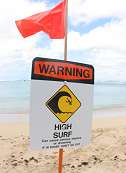|
The Feel-Good Guide to Sports, Travel, Shopping & Entertainment
|
| Main | Sports Events | Holidays & Observances | Pop Culture | Shopping | Travel |
|
MAIN
Learning to surf for beginners is all about technique and, most importantly, safety. If you're surfing instructor is too eager to get you out in the ocean without a thorough grounding in surfing safety, then it may be time to find a better surfing school. Surfing should be fun (why else do it?), but a healthy fear and respect for what the ocean can do will keep you on top of the waves instead of constantly wiping out (or worse). Knowing the rules of surfing safety will also protect those around you.
Here are some basic tips for staying safe in the surf that should become second nature after you've had a little experience: In addition to a beginner surfboard (a longboard, for added stability), your surfing gear should also include a strong ankle leash, a rashguard, appropriate sun protection, and depending on climate conditions a wet-suit complete with hood, gloves and boots. Around the Web, get a complete online education on how to surf safe, with tips on how to begin, what gear and equipment you'll need, as well as advice on mastering the wild surf to make it a fun - and safe - summer playground. Have fun! More surfing safety tips around the Web:
Surfing Handbook - Ocean Safety - The online surfing bible with extensive knowledge on how to stay safe, with tips on reading waves and currents, the surrounding landscape, with advice on avoiding other surfers and dangerous sea creatures like sharks and jellyfish. |


